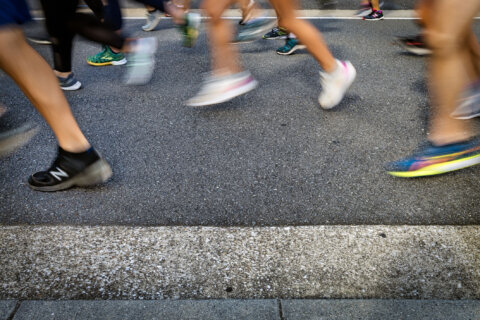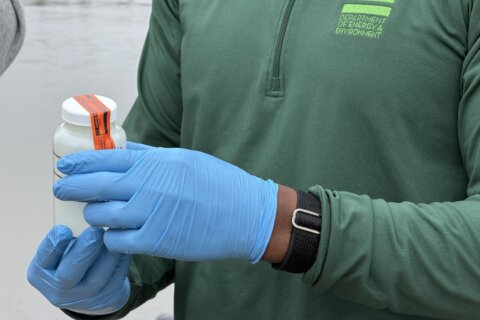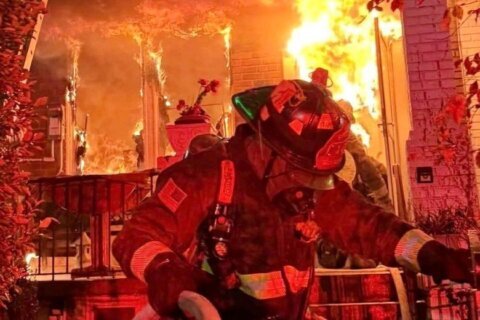The 2018 shooting that claimed the life of 10-year-old Makiyah Wilson gunned down on her way to an ice cream truck was the result of a running feud between rival street gangs, a federal prosecutor told jurors Thursday on the first day of a murder and gang conspiracy trial in D.C. that is expected to last for months.
Wilson was fatally struck in a hail of gunfire in Northeast D.C.’s Clay Terrace neighborhood in July 2018. Several others, including her older sister, were wounded.
Six men are being tried in the shooting. They are Marquell Cobbs; Darrise Jeffers; Quentin Michals; Isaiah Murchison; Gregory Taylor; and Qujuan Thomas. All are being tried on conspiracy, murder, firearm possession, assault and gang charges.
In addition to opening statements from more than half a dozen attorneys, mother Donnetta Wilson testified as the trial’s first witness.
“Makiyah was an angel,” she testified, remembering her daughter as sporty, and later describing the night her two daughters rushed inside after the shooting, both wounded, the younger fatally.
In her opening statement for the prosecution, Assistant U.S. Attorney Lindsey Merikas described the harrowing moments when a stolen Infiniti pulled up in front of an apartment courtyard on July 16, 2018, and four masked gunmen jumped out — one armed with an assault rifle — and began “pummeling that court with gunfire.”
She said 50 gunshots were fired in a matter of 20 seconds.
Merikas said jurors will hear from Makiyah’s older sister, 19-year-old Nyjhay Lewis, who will describe desperately trying to escape the gunfire, before both girls tumbled through the front door of their apartment in a “bloody heap.”
Lewis was shot through the arm, the prosecutor said, and her younger sister was shot through the heart, leaving a “gaping wound.”
“Because of them,” Merikas said, pointing at the defendants in the courtroom.
In court filings leading up to the trial, prosecutors argued the six defendants were part of a gang in the Wellington Park neighborhood, who “agreed to assault and kill anyone whose interests were contrary to their own” and used social media to enhance their status and discourage rivals in the Clay Terrace neighborhood.
Merikas described it as an internet beef that turned into real-life violence. She ran through a list of shootings and other violent acts she said were committed by members of the Wellington Park gang before the Clay Terrace shooting, including the 2017 shooting death of Carl Hardy, who was a member of a rival gang, called the Glizzy Murder Gang.
The prosecutor, citing video and social media evidence, said jurors would also see evidence that the defendants celebrated the shooting that killed Makiyah.
“You’re going to watch them celebrate,” Merikas said.
Contentious start to defense statements
Defense attorneys for all six men on trial provided opening statements Thursday, emphasizing gaps in the prosecution case and what they said was a lack of evidence tying their clients to the killing.
In the first of them, defense attorney John Zucker, representing defendant Taylor, said even though his client “embraced gangster representations,” there is no proof that his client took part in the shooting.
“I want you to try him,” not the Wellington Park gang, the defense attorney said.
He pleaded with jurors not to let outrage over the murder influence them or be clouded by sympathy and emotion when Makiyah’s mother and sister testify.
In a lengthy, at times meandering, opening statement, he called the prosecutors diligent, but said they were “pandering to fear.”
After the jury filed out of the room following Zucker’s opening statement, one of the other defense attorneys, Phillip Andonian, objected, seeking to have a mistrial declared or to have his client — Darrise Jeffers — tried separately, saying the other defense attorney’s opening statement was inappropriate. Three other defense attorneys joined in that objection, which was overruled by the Judge Robert Okun.
Erin Scialpi, defense attorney for Quentin Michals, said her client was not at the scene of the shooting and that prosecutors will “twist his words to fit their story.”
Julie Swaney, defense attorney for Qujuan Thomas, criticized prosecutors’ reliance on social media postings.
“Social media, which is a lot of their case, is not real life,” she said, adding Thomas didn’t do the things he talked about online.
Kevin McCants, the defense attorney for Marquell Cobbs, said his client did not take part in the shooting. “It is 100% not disputed Mr. Cobbs was not at Clay Terrace,” McCants said, adding that his client was a “17-year-old doing rap,” and that the government’s case was based on speculation.
Joseph B. Caleb, representing Darrise Jeffers, said his client didn’t kill anyone and wasn’t part of any conspiracy. He told jurors the government’s case “requires you to jump to conclusions.”
Carrie Weletz, the defense attorney for Isaiah Murchison, also cited what she called a lack of evidence against her client. Of prosecutors, she said, “They have scooped Mr. Murchison into this net because he grew up in Wellington Park.”
Before the trial got underway, defense attorneys also raised objections over the makeup of the jury, which is majority white and mostly made up of retirees or government employees. The trial is expected to last up to three months.
The judge also rejected those objections.
Security was tight in the courtroom, with spectators undergoing additional security screening directly before entering the courtroom.
WTOP’s John Domen contributed to this report.








